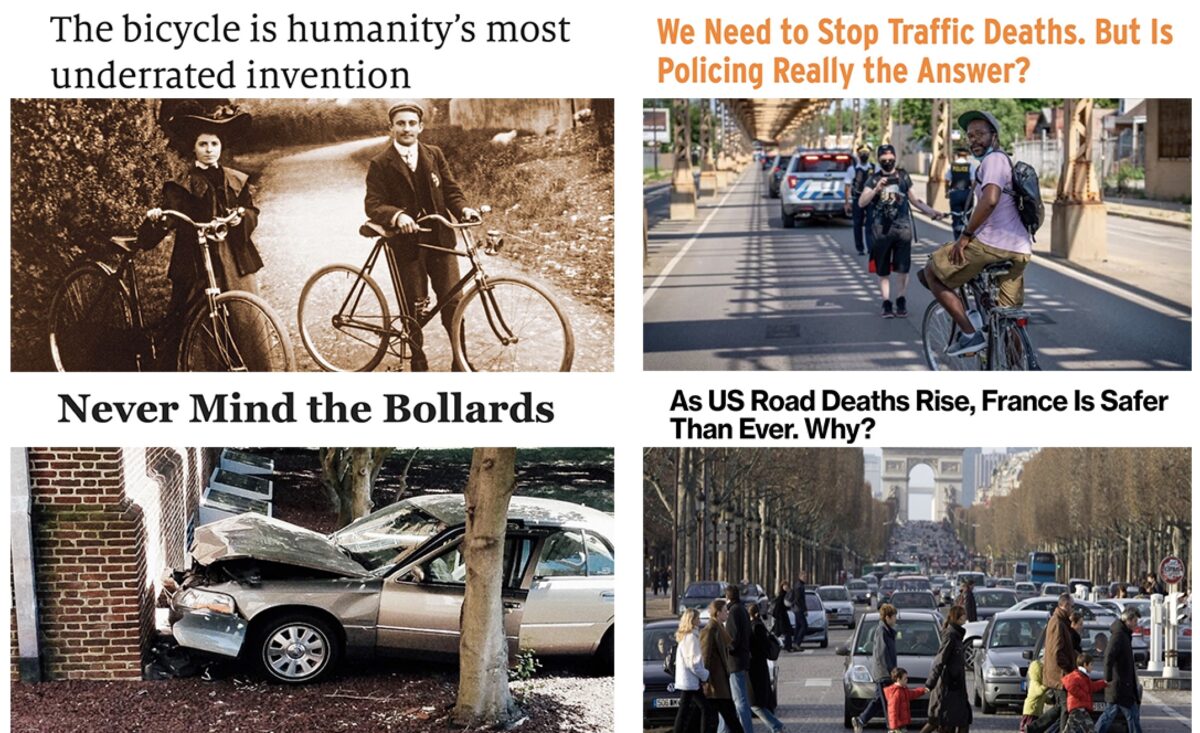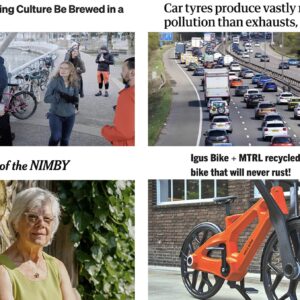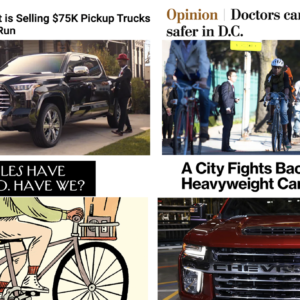
Happy Juneteenth, the (now national) holiday that marks the day in 1865 when word of the Emancipation Proclamation made its way to Texas and the last remaining Black slaves in America were finally set free. Learn more about it here.
Here are the most notable stories and other items our writers and readers came across in the past seven days.
For your consideration: In the latest sign that the utilitarian e-bike era is upon us, retail juggernaut REI has released a new “lifestyle” line “designed to help make it easier for people to hop on and go.”
Cycling history: If you haven’t heard about Jody Rosen’s excellent new book on the history of the bicycle, Two Wheels Good, I can highly recommend it! Check out this review from The Economist for a taste of its scope.
Traffic enforcement for whom? Chicago-area activist Olatunji “Oboi” Reed says the architects of Vision Zero were mostly white people who don’t fully appreciate how unjust and racist American policing practices are and instead of focusing on law enforcement we should double-down on building safer streets.
Bike lane bounty: The city traffic commission in Austin, Texas has approved a policy that would allow people to report cars that blocking bike lanes and receive 25% of the resulting infraction.
France vs U.S.: There are clear, tangible reasons why traffic deaths have gone down in France while they’ve gone up in the U.S. including lots of automated speed enforcement cameras, large carfree zones, and so on.
Bad air impacts: A glimpse into what happens when emissions are allowed to reach epidemic levels is when pollution reduces life expectancy by about 10 years like it’s doing in two states in India.
Homelessness progress: Houston has done a very admirable job reducing the amount of people who are homeless. One reason for their success is getting the nonprofit sector to speak with a united voice.
End the car pilot: Frightening research estimates that people are failing to control their cars and crashing them into buildings at a rate of about 100 times per day.
Thanks to everyone who sent in links this week.







Thanks for reading.
BikePortland has served this community with independent community journalism since 2005. We rely on subscriptions from readers like you to survive. Your financial support is vital in keeping this valuable resource alive and well.
Please subscribe today to strengthen and expand our work.
Yes, sure. But rebuilding streets takes time. What do we do in the meantime? Let the carnage continue?
And as a sanity check: On the streets we’ve recently rebuilt, do people drive sufficiently safely that there’s really no need to enforce traffic laws?
Hardesty doesn’t think police should pull anyone over. She also believes speed and red light cameras are racist and unfair. So yes, the carnage will continue in Portland.
It’s my understanding that Hardesty is an enthusiastic supporter of speed and red light cameras now.
Nevertheless, I’ve never seen anyone claim that speed/red light cameras are racist or unfair. The issue is that city employees tend to cluster cameras in poorer and more diverse neighborhoods.
And those are NOT the neighborhoods that need the cameras. My 50+ years of road cycling have taught me that the richest whitest burbs have the fastest traffic and the most arrogantly negligent drivers.
I’m gonna have to argue that shitty driving isn’t exclusive to any demographic. I live in outer SE and drivers here are plenty terrible. Come watch 122nd with me. You count speeding BMWs and I’ll count speeding cars missing hubcaps and license plates. I know who’ll end up with the higher tally but I’ll save the surprise for you!
Dave and PTB,
I’m reading a book right now which addresses this topic: Confessions of a Recovering Engineer.
When I first started getting involved with transportation issues, I must have been complaining about the cut-through congestion and lack of sidewalks on Patton Rd. A more experienced activist pointed out to me that congestion slows drivers down and, because of that reduced speed, makes things safer.
Some people drive like idiots through the hills, especially in the wee hours of the morning, because they have the road to themselves. When things go wrong, the next day you will find smashed guardrails, broken trees and damaged retaining walls. (The car has usually been removed by the time I walk by.)
Hi Soren,
The key word in your first sentence is the last one, “now.” Hardesty took a much-noted stand as the sole vote on the city council against Vision Zero back in 2019. Remember, she was talking about “distracted walkers” as being a problem. It was a source of tension between Eudaly and Hardesty.
Hardesty didn’t publicly support speed cameras until she was made the commissioner-in-charge of PBOT in early 2021. In a 180-degree turnaround (which is a good thing), she lobbied the state legislature just a few months ago to allow designated city officials, not just police, to issue camera-based citations.
PBOT’s policy has been to place the cameras on high crash locations, which strongly correlate with poorer neighborhoods, most likely because living near high-crash streets is not desirable. There are two cameras in SW Portland (out of eight?), the one on BHH is near an expensive neighborhood.
But look, people don’t forget quotes like this:
IMO, the willingness to change a contentious and publicly stated position is rare in the USA. My comment was not partisan given that I de-registered several years ago and have no intention of voting in the USA again.
Hi again Soren, your comment about not voting has kept a smile on my face since you wrote it.
I’m neck deep in getting comfortable enough with the Charter Committee work to write something about it for BP. The good thing is that it keeps my mind off USAnian news. The charter committee’s work has been outstandingly competent and professional.
Even so, you are no longer voting, and I spend way too much time compulsively weeding my yard. Better than picking at a scab, but still.
I’m so grateful for France 24, where coverage of the USA is kept to a minimum.
(Vive la France! Vive la République!)
Have you considered relocating to France? It seems like it would be a better fit for you than the crappy USA.
‘Murricans often show their abiding respect for pluralistic democracy by demanding that someone self-deport for constitutionally-protected speech.
Not demanding anything at all. It just seems like this country has absolutely nothing to offer you. It’s USAnaian this, USAnian that…so why stay? Relocate to where you can be happy.
I agree this is unfair. Why shouldn’t all neighborhoods share in the benefits of slower and safer traffic?
City employees fear pushback from wealthier neighborhoods far more than from less privileged areas.
Proof of that?
Maybe the poor neighborhoods have the most traffic violations?
Poor neighborhoods have the most crime, are begging for police and the rich liberals like yourself worry about the profiling…
I’ve always been an opponent of classical liberalism and especially of the more conservative strains in the USA.
I plan on giving ~80-90% of my middle class* wealth to extremely poor people:
https://www.givingwhatwecan.org/charities/givedirectly
This is one of the reasons I’ve lived in a dilapidated 600 square foot rental unit for 20+ years and also why I intentionally limit my spending (currently ~$22,000/year). I gain personal satisfaction from these choices and could not give a tiny f@$% what others think of my lifestyle or my motivations.
* I dislike the western middle class almost as much as the rich.
When did she say she “doesn’t think police should pull anyone over”?
And speed and red light cameras can be deployed in a racist and unfair way. That doesn’t mean we can’t use them. In fact, acknowledging this potential for state racism is an important prerequisite to an effective (a legally robust) use of traffic enforcement automation.
If we’re deploying cameras with the intent to catch people of certain races, then yes, I would agree that might be “state racism”.
Deploying cameras where they are most needed, based on data, is not.
I don’t think we will agree, but suffice it to say intent, either stated explicitly or covertly held, is not a necessary condition for a government policy to be racist. The outcome of the policy renders it racist.
We do disagree; I don’t believe that every racially disparate outcome can be tied to a racist policy. Genuinely race neutral policies can have uneven outcomes.
Not placing traffic cameras in the areas of highest need would maintain the racially disparate status quo in traffic crashes. But perhaps we also disagree about whether traffic cameras are beneficial for a community. I strongly believe they are.
If you agree that cameras are a beneficial but limited resource, and that government should work to reduce racial disparities, then you should agree that cameras should be placed in the areas of highest need, not “wasted” on areas where they will save fewer lives while also increasing the racial disparity in crash statistics.
Unless optics is more important that results.
Let’s make it simple, I’m saying institutional and systemic racism exist. And they are not predicated on the intent or malice of the individual people, the bureaucrats or technocrats designing and implementing public policy. An awareness of this fact makes any automated traffic systems more effectively public safety tool, not less. If you don’t think so, then we are at an impasse.
My original comment was a reply to Frank, who mischaracterized and dismissed JH’s initial concerns about how cameras would be used. She was not saying cameras are in and of themselves “racist and unfair”, but that implementations *could* have a deleterious effect of people and communities of color. You yourself, in the above comment, sketch out just such a scenario where cameras were fielded in such a way, without regard for what you call “highest need” that hurt communities of color. That is exactly the concern when people question how a new technology will be implemented. It’s not traffic camera = good or bad.
When designing public safety interventions, we create metrics, rubrics, schemas too understand how best to field resources most effectively. But these seemingly technocratic, data-driven systems have biases, unintended consequences, and encoded prejudices that can reproduce and reinforce inequality. An awareness of this fact can go along way towards making better policy.
I am pro traffic cameras, but let’s be smart about where we put them and how we use them. As you said, it’s not about optics, rather results.
Perhaps we agree more than I initially thought. I certainly believe that while much less than in the past, institutional racism still persists, though I think existing cases explain much less than some claim.
Most people who argue that “cameras are racist” take an anti-safety speeders-eye-view of the situation — that somehow cameras place a burden on a community, and that burden needs to be spread to communities where traffic is far less dangerous, “to make it fair”.
Cameras can save lives. Every camera that is “making it fair” in an ineffective location is not saving lives in a location where it is needed more.
I’m not sure how this intersects with your view of institutional racism, but I am concerned that the sorts of more overt racism favored by those even farther to my left, i.e. placing cameras using deliberate racial criteria, might make the system less effective overall.
I don’t claim this is your position; it sounds like you might take a more thoughtful approach.
Bike lane bounty
I would love to see our bike protected from intrusions by delivery drivers, Lyft/Uber/taxi, and other lame-o’s. I don’t love the idea of deputizing citizens to empower the scolds of our town, but it might be practical and effective enough to justify. I think the City should be removing on-street parking to create more loading zones and drop-off spots, and I would like to see drivers get tickets for not using them. The delivery drivers are pretty bad. “Better Naito” has been routinely filled with trucks. PP&R is notorious for blocking the Waterfront MUP with their giant pickups. The lane violators that annoy me the most are the Uber/Lyft who think nothing of whipping into a bike lane, throwing on their hazards while all doors open simultaneously. There is ALWAYS a safer place to do this, but that safe space is a tine bit less convenient. Anyway, I doubt the vigilantes could help with this issue.
I would love to have a citizen reporting system for parking violations, bounty or no. It’s less relevant to where I live now, but when I lived in NW Portland, I would’ve happily gone on neighborhood walks citing vehicles blocking crosswalks/fire hydrants/wheelchair access. No bounty necessary.
There would need to be checks and recourse, naturally, but I’m glad to see some US cities (or at least Austin) are already doing it, so we can borrow what works and improve on what doesn’t.
Portland’s Parking Enforcement Division does have ways to report illegally parked vehicles (by phone and online). I’ve reported a few egregious ones from time to time. Honestly, I’d report way more if I stood a chance of a cash payout.
Housing first in Houston!
“They’ve gone all in on ‘housing first,’ a practice, supported by decades of research, that moves the most vulnerable people straight from the streets into apartments”
Then one wonders why Multnomah County/City of Portland’s “housing first” is such a failure???
The article does a good job explaining what Houston does right relative to coastal cities. The biggest factor seems to me that they have lax zoning & a more robust stock of housing in general, so costs are lower & it’s easier to both build new affordable housing units & to transition people out of affordable housing and into market rate.
You can only engineer the roads so much. Enforcement is necessary moving forward and our focus should be on how to make it have more positive outcomes. We can engineer roads to make motorist go slower but how do you engineer a road to keep motorist from blowing through a 4-way stop at 40mph?
That article was a really good example of the analysis paralysis that grips our city government. Vision Zero is bad because enforcement is bad, so we should make streets safer by building bike lanes. But anyone who is anyone knows that bike lanes are also racist and the calling card of second-wave gentrifiers, so we can’t build those either. Everything is bad, everying is problematic, there is no way to move forward on anything.
We should probably form a committee and disperse a million in untracked grants to work on the problem!
We can engineer roads to make motorist go slower but how do you engineer a road to keep motorist from blowing through a 4-way stop at 40mph?
Portland even make a functional greenway to connect to millions of dollars worth of car-free bridges! I rode Flanders last night and the diversion is so poor that it has reverted to a just a regular street- full of cars and stop signs. PBOT’s pathetic attempt at a 7th greenway seems to have permanently stalled, but they built the bridge anyway?! My point is that there are ways to engineer safety, and I blelieve there are ways to increase enforcement that does not have racist outcomes, but I am losing faith that it can happen in Portland
A non sequitur, but this is certainly a mood lately for folks here all over the political spectrum and on many subjects. Myself included (I would be classified as on the far left by most, fwiw).
But then, is there anywhere in the US that’s doing significantly better? I struggle to find concrete examples.
Since you asked, a roundabout or traffic circle would put the kibosh on clearing an intersection at that speed.
How does that help a human trying to cross the street? It’s changing a space where the driver is supposed to stop with one where they don’t, which is extremely unfriendly to pedestrians.